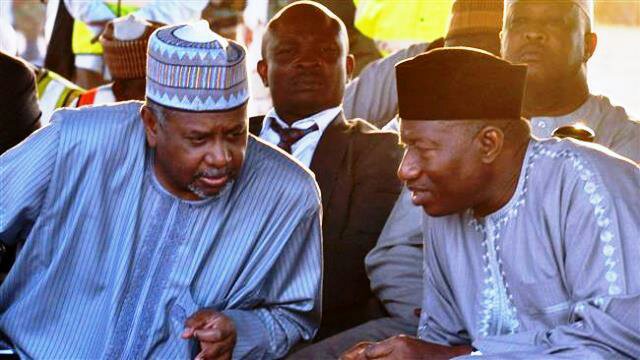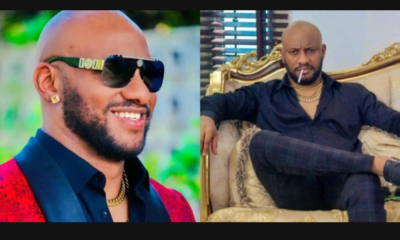News
Revealed: Despite Dedicating 13 Pages Of His Book To Corruption, Jonathan Avoids Dasuki Like A Plague
Goodluck Jonathan has been said to have avoided mentioning former national security adviser, Sambo Dasuki in his new book.
Despite dedicating 13 pages of his new book, ‘My Transition Hours’, to proving that his administration was not as corrupt as thought, former President Goodluck Jonathan passed up an opportunity to say a thing or two about the alleged $2.2billion arms deal scandal for which his National Security Adviser (NSA), Sambo Dasuki, has been in detention since 2015.

Buhari ordered Dasuki’s arrest in November 2015 after receiving the preliminary report of a 13-man investigative committee he set up to audit the procurement of arms and equipment in the armed forces and defence sector from 2007 to date.
The committee had stated thus: “The committee also discovered that payments to the tune of Three Billion, Eight Hundred and Fifty Million Naira (N3,850,000,000.00) were made to a single company by the former NSA without documented evidence of contractual agreements or fulfilment of tax obligations to the FGN.
“Further findings revealed that between March 2012 and March 2015, the erstwhile NSA, Lt Col MS Dasuki (rtd) awarded fictitious and phantom contracts to the tune of N2,219,188,609.50, $1,671,742,613.58 and €9,905,477.00. The contracts, which were said to be for the purchase of 4 Alpha Jets, 12 helicopters, bombs and ammunition, were not executed and the equipment were never supplied to the Nigerian Air Force, neither are they in its inventory.
“Even more disturbing was the discovery that out of these figures, 2 companies were awarded contracts to the tune of N350,000,000.00, $1,661,670,469.71 and €9,905,477.00 alone. This was without prejudice to the consistent non-performance of the companies in the previous contracts awarded.
“Additionally, it was discovered that the former NSA directed the Central Bank of Nigeria to transfer the sum of $132,050,486.97 and €9,905,473.55 to the accounts of Societe D’equipmente Internationaux in West Africa, United Kingdom and United States of America for un-ascertained purposes, without any contract documents to explain the transactions.
“The findings made so far are extremely worrying considering that the interventions were granted within the same period that our troops fighting the insurgency in the North East were in desperate need of platforms, military equipment and ammunition. Had the funds siphoned to these non performing companies been properly used for the purpose they were meant for, thousands of needless Nigerian deaths would have been avoided.”
Since then, Jonathan has largely avoided discussing the matter, although he did say in October 2016, while responding to questions after his lecture on Youth Entrepreneurship at the Oxford Union in the United Kingdom: “They said the National Security Adviser (Sambo Dasuki) stole $2.2billion. I don’t believe somebody can just steal $2.2 billion.
“We bought warships, we bought aircraft, we bought lots of weapons for the army and so on and so forth and you are still saying 2.2 billion, so where did we get the money to buy all those things?
“Yes, there were some issues. Yes, there are still corruption issues but some of it were over blown. I’d say exaggerated and they give a very bad impression about our nation. You cannot say the national security adviser stole $2.2billion. It is not just possible.”
He was asked the question outright; that was why he responded. But in a book wholly dedicated to repairing the battered image of the former President, his cabinet and his party, it was expected that Jonathan would not attempt to describe his administration as less corrupt than Muhammadu Buhari’s without addressing, however slightly, the biggest corruption scandal of his reign.
However, throughout the ‘13 corruption pages’, and in fact for the whole of the 194-page book, neither Dasuki nor the matter featured. The only time the accused was mentioned, it was in passing, and simply as ‘NSA’. That was on Page 66, in the third paragraph, where Jonathan listed the people he met with before reaching the decision to shift the 2015 elections by six weeks.
In foresight, Jonathan’s defence would be that the case is in court, and it would be sub judice for him to comment on it. But the case was already in court when he briefly commented on it in the UK in 2016. Also, the sub judice talk is often exaggerated. The law clearly leaves some gap for public discussions of matters in court. According to S.33 of Rules of Professional Conduct, 2007, “a lawyer or law firm engaged in or associated with the prosecution or defence of a criminal matter, or associated with a civil action shall not, while litigation is anticipated or pending in the matter, make or participate in making any extra-judicial statement that is calculated to prejudice or interfere with, or is reasonably capable of prejudicing or interfering with, the fair trial of the matter or the judgment or sentence thereon”.
So, Jonathan could have discussed the matter, at least vaguely, without breaking the law. If he did this, he could have done some bit in repairing his image in relation to corruption, especially as documents seen after Dasuki’s arrest allegedly show that Jonathan indeed approved the transactions for which Dasuki is in detention.
Why, then, would he avoid the matter?
***
Analysis by SaharaReporters
Follow us on social media:-

 Economy2 days ago
Economy2 days agoGoods worth millions of naira destroyed as fire guts spare parts market in Ibadan
-

 Celebrity Gossip & Gist1 day ago
Celebrity Gossip & Gist1 day agoMoment stage collapses on Odumodublvck during concert performance (Video)
-

 Economy1 day ago
Economy1 day agoPresident Tinubu cancels Lagos engagements in honor of food stampede victims
-

 Celebrity Gossip & Gist1 day ago
Celebrity Gossip & Gist1 day ago“The quality of a woman isn’t measured by the hair on her head but by her brain” – Yul Edochie cautions ladies against killing themselves over expensive hair this Christmas

